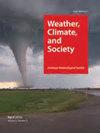气候变化和现场废水处理系统在沿海卡罗来纳:从废水管理的观点
IF 1.9
4区 地球科学
Q3 ENVIRONMENTAL STUDIES
引用次数: 0
摘要
北卡罗来纳州和南卡罗来纳州近一半的居民使用分散式或现场污水处理系统(OWTS)。随着气候的变化,依赖水处理系统的沿海社区尤其脆弱,因为风暴潮、海平面上升及其相关的地下水上升和强降雨可能会导致基于土壤的废水处理减少。尽管污水处理系统容易受到降水增加和海平面上升的影响,但人们对现场废水管理系统如何应对当前和未来的气候风险知之甚少。我们与污水处理运营商、安装商和卫生监管机构进行了访谈,以了解在当前气候条件下OWTS的功能、管理和监管,海平面上升和极端天气事件增加带来的挑战,以及可以实施哪些适应策略来减轻负面影响。我们的研究结果表明,在传统的场地变量(如土壤类型,地下水位)不受欢迎的情况下,强降水和风暴潮会导致传统化粪池系统的故障。在系统选择和选址审批中,天气和气候并不是必须考虑的调节因素,但许多OWTS管理人员都意识到它们对系统功能的影响,有些人正在先发制人地采取行动来减轻这些影响。我们的研究结果表明,填补目前监管机构与依赖OWTS的房主之间沟通结构的空白,对于卡罗来纳沿海社区在分散的废水基础设施中建立气候适应能力至关重要。本文章由计算机程序翻译,如有差异,请以英文原文为准。
Climate Change and Onsite Wastewater Treatment Systems in the Coastal Carolinas: Perspectives from Wastewater Managers
Nearly half of the residents of North and South Carolina use decentralized or onsite wastewater treatment systems (OWTS). As the climate changes, coastal communities relying on OWTS are particularly vulnerable, as soil-based wastewater treatment may be reduced by water inundation from storm surge, sea level rise and associated groundwater rise, and heavy rainfall. Despite the vulnerabilities of OWTS to increased precipitation and sea level rise, there is little known about how onsite wastewater managers are responding to current and future climate risks. We conducted interviews with wastewater operators and installers and health regulators to understand the functioning, management, and regulation of OWTS in the current climate, challenges with rising sea levels and increases in extreme weather events, and what adaptation strategies could be implemented to mitigate negative impacts. Our results indicate that heavy precipitation and storm surges cause malfunctions for conventional septic systems where traditional site variables (e.g. soil type, groundwater level) are undesirable. Weather and climate are not required regulatory factors to consider in system selection and site approval, but many OWTS managers are aware of their impacts on the functioning of systems, and some are preemptively taking action to mitigate those impacts. Our findings suggest that filling gaps in the current communication structure between regulators and homeowners relying on OWTS is critical for coastal communities in the Carolinas to build climate resilience into decentralized wastewater infrastructure.
求助全文
通过发布文献求助,成功后即可免费获取论文全文。
去求助
来源期刊

Weather Climate and Society
METEOROLOGY & ATMOSPHERIC SCIENCES-
CiteScore
3.40
自引率
13.60%
发文量
95
审稿时长
>12 weeks
期刊介绍:
Weather, Climate, and Society (WCAS) publishes research that encompasses economics, policy analysis, political science, history, and institutional, social, and behavioral scholarship relating to weather and climate, including climate change. Contributions must include original social science research, evidence-based analysis, and relevance to the interactions of weather and climate with society.
 求助内容:
求助内容: 应助结果提醒方式:
应助结果提醒方式:


